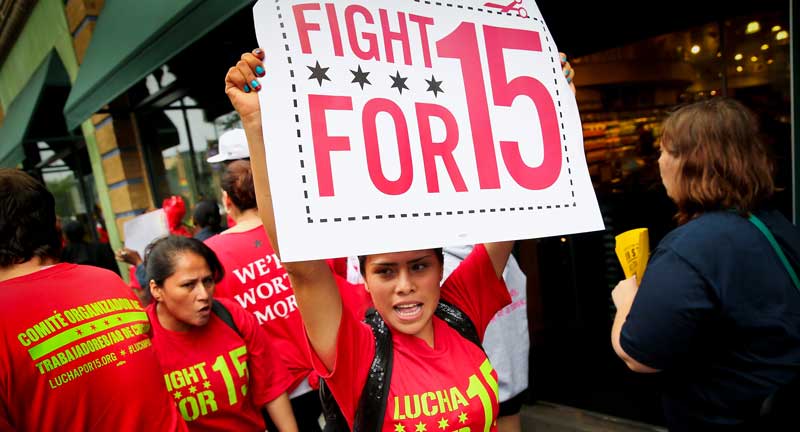Toward a Human-Rights-Based Economy for Workers & for All

Today, we celebrate the collective action of workers from coast to coast. From labor unions, to worker cooperatives, to newer models like Worker-driven Social Responsibility, organizing that democratizes the workplace has a rich history of delivering safety standards, reasonable hours, protection against sexual harassment and other discrimination, and increased wages and benefits.
The struggle for living wages continues with the Fight for $15 campaign, organizing fast food workers for $15 an hour and unionized restaurants. They are gaining traction with rallies and strikes across the country, connecting with other sectors like retail and domestic workers, and expanding even to Brazil. Recently, after weeks of testimonies by workers, a Wage Board in New York recommended raising the hourly wage to $15 for fast food workers in the state: Fight for $15 is winning by putting workers, their stories and their needs back at the center of the debate where they belong.
The progress made by Fight for $15, also in Seattle and Los Angeles, is a crucial step toward improving the dire situation of millions of workers in the United States, especially women and workers of color who are disproportionately stuck in low-wage jobs. Not only has the federal minimum wage not budged by a penny in six years; when adjusted for inflation, it has been decreasing for nearly half a century since its peak in 1968. And yet every time workers fight poverty wages, we are faced with hysteria over the supposedly disastrous effects minimum (to say nothing of living) wages will have on the economy.
Despite workers facing both sub-poverty wages and inadequate public goods and benefits, the yardsticks used in public debate – growth for growth’s sake and an obsession with profit without any regard for who benefits – continue to create a recipe for exploitation and injustice. When employees of a multinational corporation that makes billions describe “barely eating” or being unable to buy basic necessities like toilet paper, it is glaringly obvious that the system is broken. That’s why we must build on the hard-won successes from all corners of the labor movement and continue fighting to transform workplaces and industries and reclaim the economy as a whole.
A human rights framework with its principles of universality, equity, participation, transparency and accountability, can transform the metrics through which economic success is measured. Popular discourse may treat markets and the broader economy like forces akin to weather systems that cannot be controlled – only forecasted (with varying degrees of accuracy) – but the truth is, however complex global markets and finance capitalism have become, they are systems created by people that can be transformed by people to serve the needs of the people. If ensuring that all workers have the means to live a dignified life spells disaster for the market, as we so often hear predicted, then it is the market that must change.
Building a human rights economy means realizing that its purpose is to meet fundamental needs and rights, including the right to work with dignity for all workers, of all races, immigrants and citizens, women and men alike. Corporate performance measurements could include delivery of social and environmental benefits. We can replace a focus on the GDP with needs-based indicators that better capture the impact of the national economy on human well-being. Whether through wage requirements indexed to rise with needs or costs, or models like a universal basic income, everyone must have access to adequate income. Democratization of the workplace is essential to decentralize power that is now so concentrated in corporate actors. All of this must be part of a robust system of public goods that are delivered equitably by processes accountable to people and communities.
The work ahead can feel enormous because the systemic shifts needed are so fundamental. Yet the imperatives of a human rights framework moored by human rights principles provide clarity and a compass toward justice. Decades of neoliberal policies focused on privatization, fiscal austerity and deregulation in the pursuit of profit as the be-all and end-all inevitably led to staggering inequality, exploitation, and the breakdown of true democracy. Conversely, when the fulfillment of rights and needs replaces profit as the guiding star, we are on the path to equity, justice and freedom.
People are the answer. If the size of the societal transformation we seek seems daunting, look no further than the power of the workers, past and present, who fight to realize human rights for all. It is their legacy and continuing movement that we commemorate and celebrate on Labor Day.
